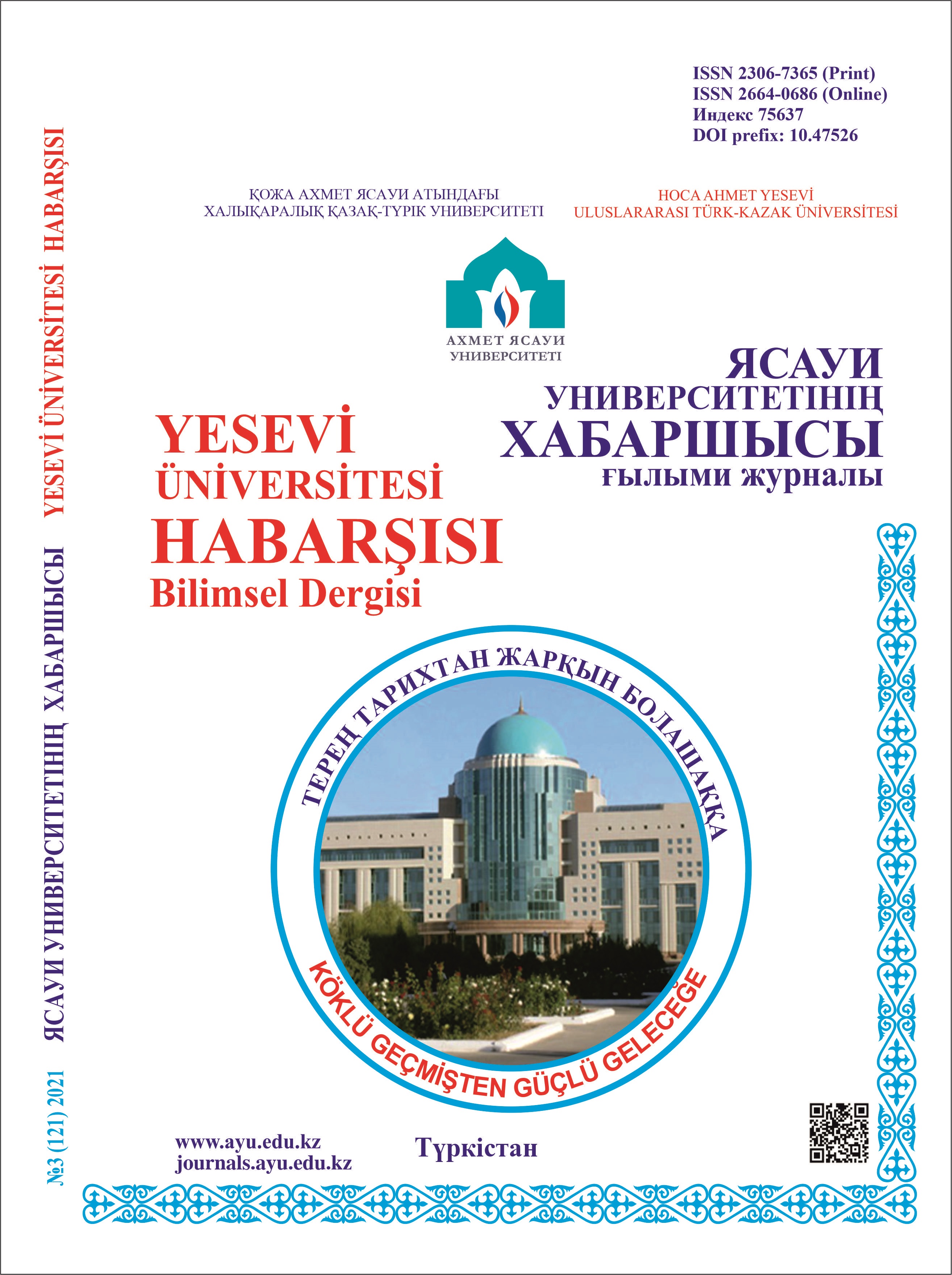PEDAGOGICAL FORMATION OF STUDENTS' COGNITIVE ACTIVITY IN AN ADAPTIVE EDUCATIONAL ENVIRONMENT
241 221
Keywords:
cognitive activity, students, pedagogical conditions, adaptive educational environment, independent work.Abstract
In modern education, the independent work of students is a necessary and important part of the educational process. Because it not only helps to consolidate the knowledge and skills acquired in practical courses but also contributes to the strengthening of cognitive activity. As a rule, one of the platforms for organizing independent work of students is an adaptive learning environment. The purpose of the study was to develop and implement a training course on the organization of independent work of students in an adaptive educational environment to increase the level of their cognitive activity. Research hypothesis: the level of cognitive activity of students increases when organizing independent work in an adaptive educational environment. By the purpose and hypothesis, the authors defined the objectives of the study: theoretical analysis of scientific literature, the study of the formation of cognitive activity of students, the study of the concepts of «pedagogical conditions» and «adaptive educational environment», diagnosis of the level of formation of cognitive activity of students; prepare students for independent work on the Moodle platform; analyze the results of the study. The proposed course included personalized adaptive learning. Second-year students of the specialty «Information Systems» of Aktobe Higher Polytechnic College in the course of mastering the subject «Mathematics» carry out training in this course. The statistics obtained indicate that the application of the developed training course in an adaptive personalized educational environment has a positive effect on increasing the level of cognitive activity of students. The data obtained by the authors can be used by teachers of other educational institutions in the process of forming the cognitive sphere of students.
References
BIBLIOGRAPHY
Кабыткина И.Б. Познавательная активность студентов: проблемы и пути повышения // Международный научно-исследовательский журнал. – 2021. – №6(108). – С. 88–91.
Бочкарева Т.Н. Познавательная активность студентов вузов как психолого-педагогическая проблема // Современные исследования социальных проблем. – 2017. – Том 8. №1 – С. 18–31.
Гацоев Д.В. Развитие познавательной активности студентов при обучении иностранному языку в неязыковом вузе // Педагогика. Вопросы теории и практики. – 2016. – №1(01). – С. 17–19.
Герасимов С.В. Познавательная активность и понимание // Вопросы психологии. – 1994. – №3. – С. 15–25.
Зверева Л.Г., Карафанасьева Е.С. Использование электронных образовательных ресурсов при изучении математики // Международный журнал гуманитарных и естественных наук. – 2022. – №1-1 (64). – С. 140–142.
Евтушенко Ю.Л., Сирик С.Н., Поволоцкий К.В. Педагогические условия формирования учебнопознавательной активности курсантов военных училищ // Педагогика и психология. – 2020. – №2. – С. 258–263.
Пашнев В.К. Психодиагностика: практикум школьного психолога: (индекс одаренности, склонность к творчеству, познавательная активность). – Ростов-на-Дону: Феникс, 2010. – 316 с.
Конаржевский Ю.А. Анализ урока. – Москва: Пед. поиск, 2000. – 334 с.
Модернизация образования: развитие идей Ю.А. Конаржевского: V Всероссийские Конаржевские чтения / сост. О.Д. Лапицкая, Е.И. Шилова. – Псков: ПОИПКРО, 2014. – 104 с.
Shchedrina, E., Valiev, I., Sabirova, F., & Babaskin, D. Providing Adaptivity in Moodle LMS Courses // International Journal of Emerging Technologies in Learning. – 2021. Vol. 16, No.02. – P. 95–107.
REFERENCES
Kabytkina I.B. Poznavatelnaia aktivnost studentov: problemy i puti povysheniia [Cognitive activity of students: problems and ways to improve] // Mejdunarodnyi nauchno-issledovatelskii jurnal. – 2021. – №6(108). – S. 88–91. [in Russian]
Bochkareva T.N. Poznavatelnaia aktivnost studentov vuzov kak psihologo-pedagogicheskaia problema [Cognitive activity of university students as a psychological and pedagogical problem] // Sovremennye issledovaniia socialnyh problem. – 2017. – Tom 8. №1 – S. 18–31. [in Russian]
Gacoev D.V. Razvitie poznavatelnoi aktivnosti studentov pri obuchenii inostrannomu iazyku v neiazykovom vuze [Development of cognitive activity of students when teaching a foreign language in a non-linguistic university] // Pedagogika. Voprosy teorii i praktiki. – 2016. – №1(01). – S. 17–19. [in Russian]
Gerasimov S.V. Poznavatelnaia aktivnost i ponimanie [Cognitive activity and understanding] // Voprosy psihologii. – 1994. – №3. – S. 15–25. [in Russian]
Zvereva L.G., Karafanasieva E.S. Ispolzovanie elektronnyh obrazovatelnyh resursov pri izuchenii matematiki [The use of electronic educational resources in the study of mathematics] // Mejdunarodnyi jurnal gumanitarnyh i estestvennyh nauk. – 2022. – №1-1 (64). – S. 140–142. [in Russian]
Evtushenko Iu.L., Sirik S.N., Povolockii K.V. Pedagogicheskie usloviia formirovaniia uchebnopoznavatelnoi aktivnosti kursantov voennyh uchilish [Pedagogical conditions for the formation of educational and cognitive activity of cadets of military schools] // Pedagogika i psihologiia. – 2020. – №2. – S. 258–263. [in Russian]
Pashnev V.K. Psihodiagnostika: praktikum shkolnogo psihologa: (indeks odarennosti, sklonnost k tvorchestvu, poznavatelnaia aktivnost) [Psychodiagnostics: a school psychologist's workshop: (giftedness index, creativity propensity, cognitive activity)]. – Rostov-na-Donu: Feniks, 2010. – 316 s. [in Russian]
Konarjevskii Iu.A. Analiz uroka [Lesson Analysis]. – Moskva: Ped. poisk, 2000. – 334 s. [in Russian]
Modernizaciia obrazovaniia: razvitie idei Iu.A. Konarjevskogo: V Vserossiiskie Konarjevskie chteniia [Modernization of education: the development of the ideas of Yu.A. Konarzhevsky] / sost. O.D. Lapickaia, E.I. Shilova. – Pskov: POIPKRO, 2014. – 104 s. [in Russian]
Shchedrina, E., Valiev, I., Sabirova, F., & Babaskin, D. Providing Adaptivity in Moodle LMS Courses // International Journal of Emerging Technologies in Learning. – 2021. Vol. 16, No.02. – P. 95–107.

